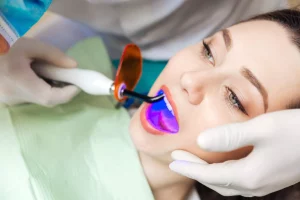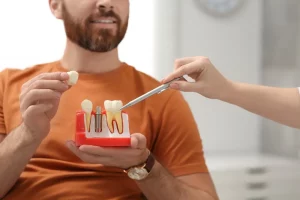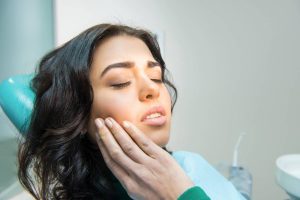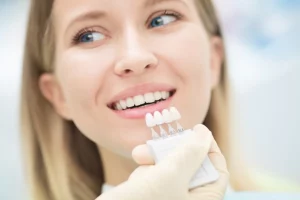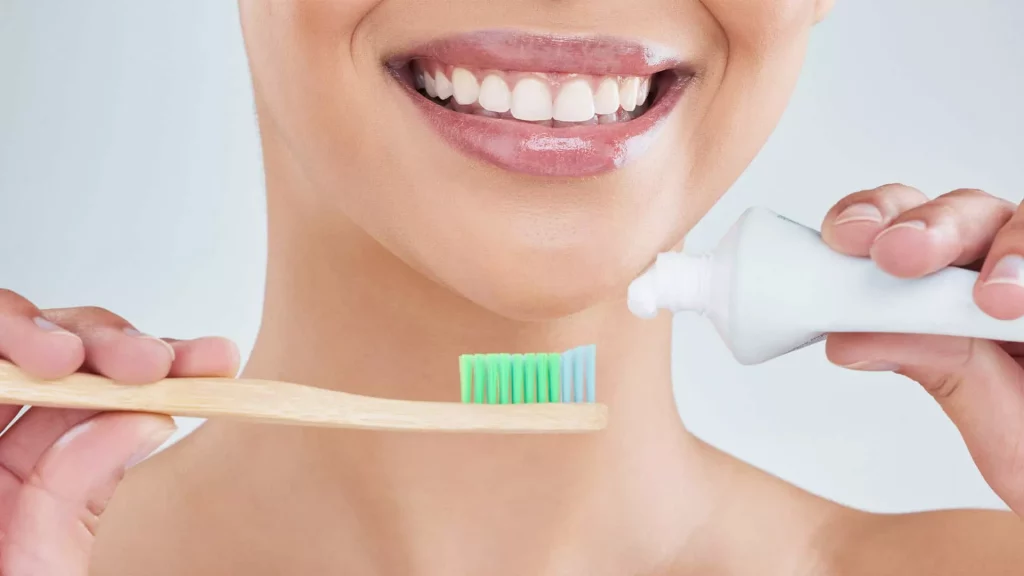Last Updated on: 13th November 2025, 07:18 am
Vegetarian diets offer many health benefits, but without careful planning, your oral health could be at risk.
Each day, more people are switching to vegetarian or vegan diets for health, ethical, or environmental reasons. While plant-based eating supports overall wellness, many don’t realize how it can impact their teeth and gums.
This article will guide you through the potential dental risks behind what some call “vegetarian teeth” and share simple ways to keep your smile strong and healthy on a plant-based lifestyle.
What happens to teeth on a vegetarian diet?

When you follow a vegetarian diet, you cut out many animal-based foods that are naturally high in key nutrients like calcium, vitamin D, and vitamin B12, all of which are essential for keeping your teeth and gums healthy.
Without these, your teeth may become more vulnerable to problems like:
It’s also important to remember that not all plant-based diets are the same; there are many types. The most common are:
- Vegans: Avoid all animal products, including meat, fish, dairy, eggs, and even honey.
- Lacto-ovo vegetarians: Do not eat meat or fish, but still consume dairy products and eggs.
- Flexitarian: Mostly follows a vegetarian diet but occasionally includes small amounts of meat and fish.
The more restrictive the diet, the higher the risk of missing key nutrients, so oral health issues will vary depending on the type of vegetarian diet you follow.
The role of nutrient deficiencies in oral health
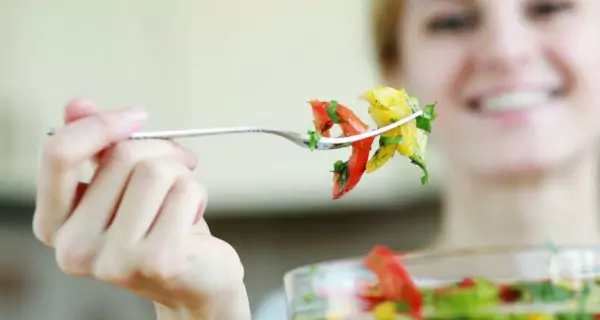
Let’s look at how specific nutrient gaps can impact your teeth and gums and how to make sure you’re getting enough, even without animal products.
Calcium
A calcium deficiency weakens tooth enamel and can make your teeth prone to erosion, sensitivity, and damage over time.
- Mouth symptoms: Enamel erosion, which may cause sensitivity and increase the risk of cavities.
- What to do: Eat fortified plant-based milks (like almond, soy, or oat), tofu, tahini, almonds, kale, and bok choy.
Vitamin D
Without enough vitamin D, your body can’t absorb calcium properly, even if you eat enough of it.
- Mouth symptoms: Weak or loose teeth due to reduced bone density in the jaw.
- What to do: Get moderate sun exposure and consume fortified foods (like plant milks, cereals, and mushrooms). A vegan vitamin D3 supplement may also help.
Vitamin B12
This vitamin is essential for gum health and nerve function. It’s almost entirely found in animal-based foods.
- Mouth symptoms: Gum inflammation, bleeding, painful mouth sores, or burning sensations.
- What to do: Eat fortified plant-based products (such as nutritional yeast, cereals, and soy milk) or take a B12 supplement regularly.
Iron
Iron is necessary for transporting oxygen in the blood and supporting immune function.
- Mouth symptoms: Pale gums, tongue soreness, increased risk of oral infections.
- What to do: Add lentils, chickpeas, spinach, quinoa, tofu, and pumpkin seeds to your meals. Combine them with vitamin C-rich foods like oranges or bell peppers to boost absorption.
Protein and essential amino acids
Some essential amino acids are hard to get on a strict plant-based diet. These help repair tissues and support immune defenses in your mouth.
- Mouth symptoms: Slower healing, increased risk of gum infections, and weakened oral tissues.
- What to do: Combine legumes and whole grains (like rice and beans or hummus and pita) to create complete proteins. Vegan protein powders can also be helpful.
Healthy fats
Fats help stimulate saliva production, protecting teeth from harmful acids and bacteria.
- Mouth symptoms: Dry mouth, which can lead to bad breath and a higher risk of cavities.
- What to do: Include plant-based fats like avocados, olive oil, nuts, and seeds in your daily diet. Drink plenty of water and chew sugar-free gum if needed to boost saliva.
When we understand how each nutrient affects our oral health, we will make smarter choices to protect our teeth and gums. A well-planned vegetarian diet can absolutely support a healthy smile.
Common myths about vegetarian teeth and oral health
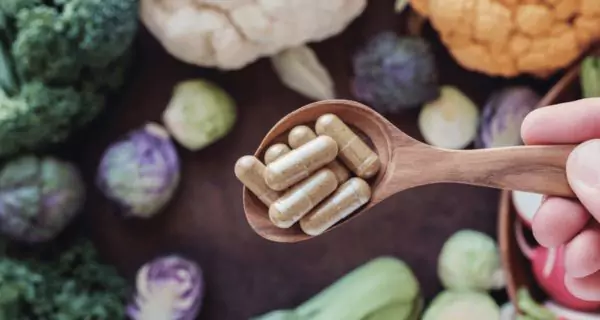
Unfortunately, there is still a lot of misinformation out there about oral health and vegetarian diets, which brings us to some of the most common myths.
Myth 1 – “Vegetarians don’t get cavities”
Reality: Cavity risk is more about what and how often you eat – and how well you brush – and not whether you eat meat.
Just because you cut out candy and meat doesn’t mean you’re cavity-proof. Many vegetarian foods, like dried fruit, white rice, and bread, can turn into sugar and acid in your mouth.
Myth 2 – “A plant-based diet has all the nutrients you need”
Reality: A vegetarian diet needs to be planned carefully to ensure that you’re not missing key vitamins and minerals for your teeth.
Many people think eating veggies and grains is enough to stay healthy, but some nutrients (like B12 or vitamin D) are very hard to get without animal products.
Myth 3 – “Supplements can replace a balanced diet”
Reality: Supplements can help, but they should never replace a diverse and balanced diet.
Taking a pill doesn’t give your body everything it needs. Whole foods offer fiber, antioxidants, and other health benefits.
Myth 4 – “Vegetarian diets cause tooth loss”
Reality: Tooth loss usually comes from gum disease, poor hygiene, or avoiding the dentist – not vegetarianism.
Some extreme stories claim that avoiding meat will destroy your teeth. That’s just not true.
Myth 5 – “Healthy eating means you don’t need a dentist”
Reality: Regular dental visits are essential for everyone, no matter what they eat.
Even if your diet is perfect, your dentist can catch issues you won’t notice, like early enamel wear or gum recession.
When to see a dentist if you’re on a plant-based diet

Ideally, it’s best to visit your dentist before starting a vegetarian or vegan diet. A dental professional will help you plan a balanced approach that keeps your teeth and gums strong and healthy.
If you already have a higher risk of certain dental issues, like enamel erosion or gum sensitivity, your dentist can also recommend the best products and habits for your specific needs.
Alert signs
Even after making the switch, your mouth might give you subtle signs that something isn’t quite right with your diet. Here are some symptoms to watch for:
- Tooth sensitivity (especially to cold or sweet foods)
- Sore or burning tongue
- Bleeding gums
- More cavities than usual
- Bad breath that doesn’t go away
If you notice any of these, it’s a good idea to schedule a dental checkup. Your dentist might recommend blood tests or suggest small changes to your eating habits.
Preventive measures for healthy vegetarian teeth
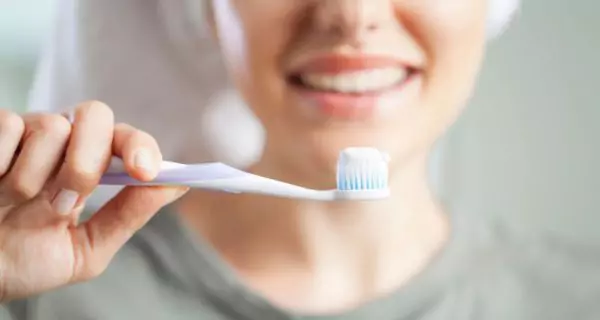
Whether you’re new to plant-based eating or a long-time vegetarian, these tips can help protect your oral health:
- Brush with fluoride toothpaste: Fluoride strengthens enamel and helps fight cavities.
- Don’t skip dental checkups: Visit your dentist at least twice a year to catch problems early.
- Plan balanced meals: Make sure you’re getting enough protein, vitamins, and minerals, not just cutting out meat.
- Stay hydrated: Drinking water keeps your mouth clean and helps your body make saliva, which protects your teeth.
- Limit acidic foods: Citrus fruits, vinegar, and some teas wear away enamel if consumed too often. Rinse with water after eating them and wait 30 minutes before brushing.
Being vegetarian doesn’t mean your teeth have to suffer. It’s absolutely possible to follow a plant-based diet and keep your teeth and gums healthy; you just need the right information, a balanced diet, good oral hygiene, and support from a dental professional.
Our bodies are smart. They usually give us little signs when something isn’t right. Paying attention to those signals and acting early can make all the difference for your oral and overall health.
Frequently Asked Questions (FAQ)
References
1. Booth, J., & Hurry, J. (2020). The impact of a vegan diet on oral health. BDJ Team, 7(7), 18–19. https://doi.org/10.1038/s41407-020-0372-3
2. Buzalaf, M. a. R., Magalhães, A. C., & Rios, D. (2018). Prevention of erosive tooth wear: targeting nutritional and patient-related risk factors. BDJ, 224(5), 371–378. https://doi.org/10.1038/sj.bdj.2018.173
3. McCann, C. (2023). The impact of a vegetarian diet on oral health. BDJ Team, 10(4), 12–13. https://doi.org/10.1038/s41407-023-1817-2
4. Oral Health Foundation. (2024, January 14). Nourishing smiles: the intersection of vegan food and oral health. Oral Health Foundation. https://www.dentalhealth.org/blog/vegan-food-and-oral-health
5. Smits, K. P. J., Listl, S., & Jevdjevic, M. (2019). Vegetarian diet and its possible influence on dental health: A systematic literature review. Community Dentistry and Oral Epidemiology, 48(1), 7–13. https://onlinelibrary.wiley.com/doi/10.1111/cdoe.12498







